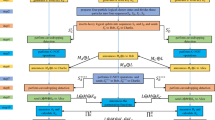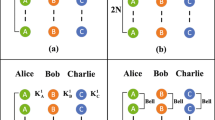Abstract
Recently, Li et al. (Int J Theor Phys: DOI: https://doi.org/10.1007/s10773-020-04588-w, 2020) proposed a multiparty quantum key agreement protocol via non-maximally entangled cluster states. They claimed that the proposed protocol can help all the involved participants have equal influence on the final shared key. However, this study points out a loophole that makes Li et al.’s protocol suffer from a collusion attack, i.e. several dishonest participants can conspire to manipulate the final shared key without being detected by others. To avoid this loophole, an improvement is proposed here.


Similar content being viewed by others
References
Bennet, C.H., Brassard, G.: Quantum Cryptography: Public Key Distribution and Coin Tossing. In Proceedings of the IEEE International Conference on Computers, pp. 175–179. Systems and Signal Processing, Bangalore, India (1984)
Boyer, M., Kenigsberg, D., Mor, T.: Quantum key distribution with classical Bob. In: Quantum, Nano, and Micro Technologies, 2007. ICQNM'07. First International Conference on, pp. 10–10: IEEE (2007)
Boyer, M., Gelles, R., Kenigsberg, D., Mor, T.: Semiquantum key distribution. Phys. Rev. A. 79(3), 032341 (2009)
Lo, H.-K., Ma, X., Chen, K.: Decoy state quantum key distribution. Phys. Rev. Lett. 94(23), 230504 (2005)
Renner, R.: Security of quantum key distribution. Int. J. Quant. Inf. 6(01), 1–127 (2008)
Zhou, N., Zeng, G., Xiong, J.: Quantum key agreement protocol. Electron. Lett. 40(18), 1149–1150 (2004)
Li, T., Wang, X., Jiang, M.: Quantum key agreement via non-maximally entangled cluster states. Int. J. Theor. Phys. 1–16 (2020)
Acknowledgments
We would like to thank the Ministry of Science and Technology of the Republic of China, Taiwan for partially supporting this research in finance under the Contract No. MOST 109-2221-E-006-168-; No. MOST 108-2221-E-006-107-.
Author information
Authors and Affiliations
Corresponding author
Additional information
Publisher’s Note
Springer Nature remains neutral with regard to jurisdictional claims in published maps and institutional affiliations.
Rights and permissions
About this article
Cite this article
Gu, J., Hwang, T. Collusion Attack and Counterattack on the Quantum Key Agreement Via Non-maximally Entangled Cluster States. Int J Theor Phys 60, 331–337 (2021). https://doi.org/10.1007/s10773-020-04695-8
Received:
Accepted:
Published:
Issue Date:
DOI: https://doi.org/10.1007/s10773-020-04695-8




